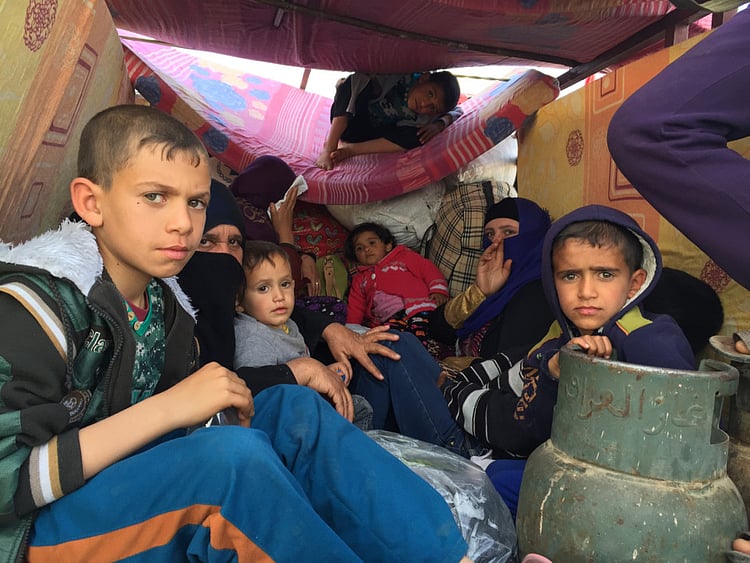Alam, Iraq: Sabha Al Jabbouri gingerly opened the door to her family home to see a kitchen strewn with dirty pots and pans and rubbish. On the table was a half-eaten meal, indicating that the unwelcome guests who had lived here for eight months had left in a hurry.
On the wall outside was scrawled: “Property of Daesh.” Seized after Al Jabbouri’s family fled in late June, the home had been used as an administrative office by terrorist group. Printed forms from its “Department of Prisons” had been tossed around downstairs bedrooms that were filled with desks and printers.
“May God destroy them,” Al Jabbouri cried, as she shut kitchen cupboard doors and surveyed the mess. “They pretend they are religious men, but look, they live like animals.”
Her family is among more than 200 that had returned to the Sunni town of Alam in Iraq’s Salah Al Deen province in the first 30 hours after it was reopened to residents this past week, according to figures from militiamen manning the town’s checkpoints. But those going home are a lucky minority.
An offensive aimed at retaking Tikrit from Daesh forces has secured a string of Sunni towns and villages in the province, which military leaders claim is now largely under government control. But the cars and trucks packed with children, blankets and mattresses backed up at Alam’s main checkpoint represent just a handful of the thousands of Sunnis displaced from the area. The returnees here are almost exclusively from the Al Jabbour tribe, which has garnered a reputation for its fierce resistance to Daesh.
The Shiite militias that now control the area view other Sunnis with suspicion, accusing them of sympathizing or collaborating with the extremists. Just a few miles down the road, the village of Al Dawr remains closed to returning residents, while militiamen have burned houses in nearby Abu Ajeel.
“We are only letting families back in to Al Alam, to be more specific, only Al Jabbour,” said Sa’ad Al Daraji, a Shiite militiaman manning the checkpoint. “The others were supporting Daesh,” he said. “They don’t have any mercy, so why should we have mercy for them.”
Some Iraqi officials also worry that if they allow residents back, Daesh militants could mix in with returning families, posing a security threat.
But keeping them out exacerbates the Sunni-Shiite tension that underlies Iraq’s violence and has helped drive many Sunnis away from the state and toward groups like Daesh.
Mindful of accusations of atrocities by Shiite militias, Daraji, who fights with the Badr Organization, one of Iraq’s largest Iranian-backed paramilitary groups, stressed he has orders to not harm anyone.
“Anyone who cuts a tree or even harms an animal will be punished,” he said. But still, most former residents of nearby villages are not welcome back.
“Alam is different, they stood with us against [Daesh] since the beginning,” said Karim Al Nouri, a spokesman for Badr. In other towns, provincial councils need to work out who should be allowed back, he said.
For 13 days in June, Alam resisted Daesh militants even though the town’s fighters were outgunned and running out of ammunition. Finally, they capitulated to the extremists at their door.
Some, like Al Jabbouri, who does not know her age, fled as soon as the town fell. Her shoes still lie, dust-covered, in the driveway, where they slipped off as she made her hurried escape.
Other people decided to risk staying, with Daesh initially indicating that it would not harm Sunni residents.
“They were soft with us when they first came in,” said Rashed Saleh Al Jabbouri, 33, as he waited in his car at a checkpoint with his wife and three children to return to the town. They fled in November, after Daesh, suspecting that local residents were mobilizing against them, began mass arrests. A month later, 13 members of Al Jabbour tribe forced to wear orange jumpsuits were lined up and executed in the town’s square.
Since Daesh fighters were pushed out of Alam earlier this month, Al Jabbour tribesmen and Shiite militias have built a close alliance - so much so that hundreds of Al Jabbour have signed up to join the largely Shiite groups.
Two of Al Jabbouri’s sons have signed up to Asaib Al Alam, a Sunni offshoot of Asaib Ahl Al Haq, one of Iraq’s most notorious Shiite militias.
“Something that harms you, at the same time can be useful,” said one of the sons, 36-year-old Ebrahim Ali Al Jabbouri, commenting on the Sunni-Shiite cooperation in the town in the face of Daesh.
But residents of other towns say they feel that they are being sidelined in efforts to secure their homes.
Sohaib Al Douri, a 31-year-old from neighboring Al Dawr, watched his town’s liberation from afar.
“My feelings are mixed between pain, sadness and joy,” he said by phone from Sulaimaniya in Iraq’s Kurdish region, where his family has sought shelter. “I was happy to see that my town was liberated but sad to see it only through the television.
“We didn’t have the honor of helping to liberate it, but we’d now like to be given the honor of being able to secure our town and hold the ground.”
Sign up for the Daily Briefing
Get the latest news and updates straight to your inbox
Network Links
GN StoreDownload our app
© Al Nisr Publishing LLC 2026. All rights reserved.
